1. Overview
Almazbek Atambayev, a prominent Kyrgyz politician, served as the President of Kyrgyzstan from 2011 to 2017. His presidency marked a significant period in Kyrgyzstan's democratic development, characterized by a commitment to the rule of law and a peaceful transfer of power, a first in modern Central Asia. During his tenure, Atambayev championed constitutional reforms that strengthened the role of the parliament and introduced a biometric election system, enhancing electoral transparency with support from the European Union. He also implemented progressive gender equality policies and promoted secularism, advocating for freedom of expression. His administration launched the World Nomad Games to preserve nomadic traditions and was the first Central Asian leader to honor the victims of the 1916 Central Asian Revolt against the Russian Empire, fostering national identity and reconciliation. Despite these achievements, his post-presidency was marred by political conflicts with his successor, Sooronbay Jeenbekov, leading to legal charges, imprisonment, and international concerns over his human rights and health.
2. Early Life and Education
Almazbek Atambayev's early life and educational background laid the foundation for his later political career, marked by a commitment to democratic values.
2.1. Early Life and Family
Almazbek Sharshenovich Atambayev was born on September 17, 1956, in the village of Arashan, located in the northern Chüy of the then Kirghiz SSR. His father, Sharshen Atambayev, was a veteran of World War II, having served on the front lines in Eastern Europe with the Red Army. Atambayev has four children from his first marriage to Buazhar: two sons, Seyit and Seytek, and two daughters, Diana and Dinara. In 1988, he married his second wife, Raisa, an ethnic Tatar born in the Ural Mountains of Russia, who later moved to Osh as a child. Raisa is a doctor. Together, they have six children, including daughters Aliya (born 1997), Diana, and Dinara, and sons Seyit, Seytek, and Khadyrbek (born 1993). His daughter, Aliya Shagieva, is a renowned artist in Kyrgyzstan. In January 2018, Atambayev published a song he authored titled "Kyrgyzstan," which was later re-written by Azerbaijani performer Araz Elses.
2.2. Education
Atambayev pursued his higher education at the Moscow Institute of Management, where he earned a degree in economics, specializing in economic engineering and production management. After graduating, he began his career in 1980, working as an engineer and later a chief engineer at the Kirghiz SSR Ministry of Communications until 1983. From 1983 to 1987, he served in the Secretariat of the Presidium of the Supreme Council of the Kirghiz SSR. Subsequently, from 1987 to 1989, he was the First Deputy Chairman of the Pervomaisky District Executive Committee in Frunze (now Bishkek). In 1989, Atambayev founded "Forum," Kyrgyzstan's first private enterprise. His business ventures were highly successful, reportedly contributing as much as 20% of the country's GDP through taxes, comparable to the Kumtor Gold Mine. He accumulated significant wealth through his businesses in Russia and Turkey. However, around 2002, several of his businesses faced closures or forced sales, which Atambayev attributed to pressure from the administration of then-President Askar Akayev.
3. Political Career (Early)
Almazbek Atambayev's early political career was marked by his involvement in the establishment of the Social Democratic Party of Kyrgyzstan, his participation in government roles, and his significant contributions to democratic movements, including the Tulip Revolution.
3.1. Social Democratic Party of Kyrgyzstan Activities
In 1993, Almazbek Atambayev became one of the founding members of the Social Democratic Party of Kyrgyzstan (SDPK). He served as the party's Chairman from July 30, 1999, until September 23, 2011. Under his leadership, the SDPK actively fought for the establishment of the rule of law and justice, attracting broad public support. The party's ideology and activities were centered on promoting democratic change and human rights in Kyrgyzstan. From 1995 to 2000, Atambayev served as a deputy of the Jogorku Kenesh, the Kyrgyz legislature. From December 24, 2008, he was a member of the Political Bureau of the "United National Movement," and became its Chairman on September 9, 2009.
3.2. Government Participation and Protests
Atambayev first ran as a presidential candidate in the October 2000 election, receiving 6% of the vote. He later served as the Minister of Industry, Trade and Tourism in the Government of Kyrgyzstan from December 20, 2005, until his resignation on April 21, 2006. In November 2006, he emerged as a prominent leader of anti-government protests in Bishkek, organized under the banner of the 'For Reform!' movement. He had also participated in earlier protests in April 2006. In December 2006, Atambayev publicly rejected calls for the dissolution of the Supreme Council, warning of potential "war" in Kyrgyzstan if an authoritarian constitution were illegally adopted, and vowed to resist such measures through all possible protest actions.
3.3. Tulip Revolution
Almazbek Atambayev played a pivotal role in the Tulip Revolution of March 2005, a significant event that led to the overthrow of President Askar Akayev. The tulip was a symbol associated with the Kyrgyz Social Democratic Party during this period. Atambayev's active participation in the protests and his decisive speeches against corruption and authoritarianism positioned him as a leading force for democratic change. Under his leadership, the Social Democratic Party actively supported and mobilized protesters, becoming one of the key organizers of the mass rallies that ultimately led to Akayev's ouster. Atambayev utilized his platform to advocate for democratic reforms and the improvement of human rights across the country.
4. Prime Ministership
Almazbek Atambayev served two distinct terms as Prime Minister, navigating complex political landscapes and contributing to the formation of coalition governments.
4.1. 2007 Premiership
Following the resignation of Prime Minister Azim Isabekov on March 29, 2007, Almazbek Atambayev was appointed acting Prime Minister by President Kurmanbek Bakiyev. His appointment was confirmed by the parliament on March 30 with a vote of 48-3, making him the first prime minister in Central Asia to come from an opposition party. On April 11, he attempted to address a large protest in Bishkek demanding Bakiyev's resignation but was booed by the demonstrators. Atambayev's government resigned on October 24, 2007, following a constitutional referendum, though it was expected to remain in office until the parliamentary election in December. However, Atambayev officially resigned on November 28, 2007. President Bakiyev accepted his resignation, praising his performance, and appointed Acting First Deputy Prime Minister Iskenderbek Aidaraliyev in his place. Edil Baisalov of the Social Democratic Party claimed that Atambayev was forced out of office because he was an obstacle to alleged government interference in the parliamentary election.
4.2. 2010-2011 Premiership
On April 6, 2010, anti-government protests escalated into riots, leading President Bakiyev to flee Bishkek on April 8. In response, an interim government led by Roza Otunbayeva was formed, with Atambayev appointed as Deputy Prime Minister. He resigned from this position on July 13, 2010. Following the 2010 Kyrgyz parliamentary election, Atambayev was again chosen to serve as Prime Minister, leading a coalition government that included his SDPK, Respublika, and Ata-Zhurt, which had won a plurality in the election. He assumed office on December 17, 2010. In August 2011, Atambayev announced his candidacy for the 2011 Kyrgyz presidential election to succeed Roza Otunbayeva. During the election campaign, Omurbek Babanov served as acting Prime Minister. On election day, October 30, 2011, Atambayev won by a landslide, securing 63% of the vote against opponents Adakhan Madumarov and Kamchybek Tashiev, with approximately 60% voter turnout. He resigned as Prime Minister upon his presidential inauguration.
5. Presidency (2011-2017)
Almazbek Atambayev's presidency was marked by significant domestic reforms aimed at strengthening democratic institutions and a proactive foreign policy focused on regional cooperation and engagement with international partners.
5.1. Inauguration
Almazbek Atambayev was inaugurated as President on December 1, 2011, at the Kyrgyz National Philharmonic Hall in Bishkek. The ceremony was attended by several international dignitaries, including the President of Turkey, Abdullah Gül, Prime Minister of Kazakhstan Karim Massimov, Prime Minister of Azerbaijan Artur Rasizade, and President of Georgia, Mikheil Saakashvili. High-level Russian officials, including the head of the Presidential Administration of Russia Sergey Naryshkin and the Head of the Chechen Republic Ramzan Kadyrov, were expected but sent lower-level representatives. During his inaugural speech, Atambayev declared, "Today we are writing a new story. This is not the history of the president, but a new history of our country." The inauguration ceremony's budget was notably modest, costing less than half of what was spent for Kurmanbek Bakiyev's inauguration in August 2009, amounting to approximately 10.00 M KGS. Unlike the breastplates used for the inaugurations of Akayev, Bakiyev, and Otunbayeva, which were adorned with diamonds and pearls, the jewelers opted not to use such gems in the 108-centimeter-long breastplate, considering them an "imported" element in the national culture.
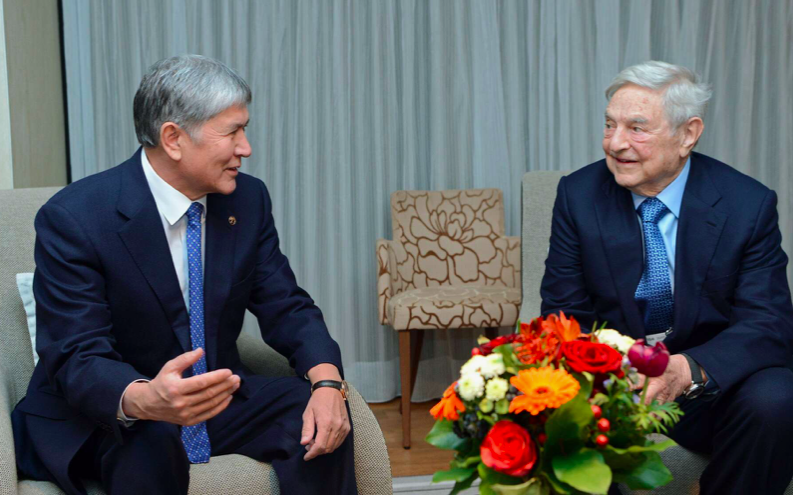
Prominent international figures offered their perspectives on Atambayev's presidential term. George Soros spoke positively, stating that "Kyrgyzstan was lucky to have a non-corrupt president," emphasizing the positive impact of a non-corrupt leader on the country's democratic development. Alexander Soros also praised the digitalization efforts of the Kyrgyz government in the Taza Koom project. Vladimir Putin characterized Atambayev as a person who "keeps his word... It is sometimes difficult to agree on something with him, but if something has already been agreed, he goes to the end in fulfilling the agreements reached." At the end of Atambayev's presidential term, UN Secretary-General António Guterres visited Kyrgyzstan and affirmed that "Kyrgyzstan and the people of the country are committed to the ideas of the rule of human rights, democracy, and this was actually an important choice for the Kyrgyz people." Atambayev notably chose to step down after his single presidential term, adhering to the Constitution, despite requests from Vladimir Putin and Nursultan Nazarbayev to remain in power. He explained his decision by stating, "Russian President Vladimir Putin and Kazakh President Nursultan Nazarbayev asked me to stay for a second term, but I explained that I could not, because we have a different people. People will choose the one whom they consider the most worthy."
5.2. Domestic Policy
Atambayev's domestic policies focused on strengthening governance, electoral integrity, social equality, and national security.
5.2.1. Constitutional Reform and Parliamentary Strengthening
Atambayev presided over a 2016 Kyrgyz constitutional referendum that proposed increasing the powers of the Prime Minister and the government, alongside reforms to the judicial system. International experts positively assessed this constitutional reform, viewing it as a transition to a parliamentary form of government and a strengthening of the roles of the Prime Minister and Parliament. They also noted that these changes were intended to stabilize the institution of power and counter the growing spread of Islamist ideology in the country. The referendum also clarified the validity of marriage contracts as outlined in the 2010 Constitution of Kyrgyzstan. The proposed changes were overwhelmingly approved by nearly 80% of the Kyrgyz population.
5.2.2. Introduction of Biometric Election System
A significant achievement during Atambayev's presidency was the introduction of biometric passports and a biometric electoral system, which dramatically enhanced election transparency and prevented individuals from voting multiple times by requiring fingerprint identification. The 2014 law "On Biometric Registration of Citizens of the Kyrgyz Republic" was crucial in developing the framework for democratic elections. The European Union provided assistance to Kyrgyzstan in organizing the 2015 parliamentary elections, which were widely recognized as fair and competitive. Atambayev secured this assistance during his 2013 visit to Brussels, where he held discussions with President of the European Parliament Martin Schulz, President of the European Council Herman Van Rompuy, and President of the European Commission Jose Manuel Barroso. Federica Mogherini, during her 2017 visit to Kyrgyzstan, specifically acknowledged Atambayev's "indisputable merits in the comprehensive improvement of the electoral process in the republic, as well as the development of democratic institutions."
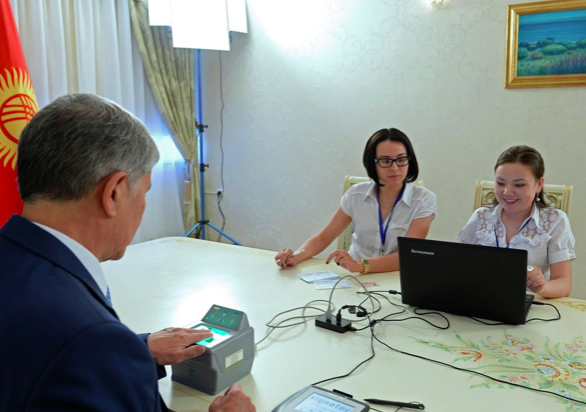
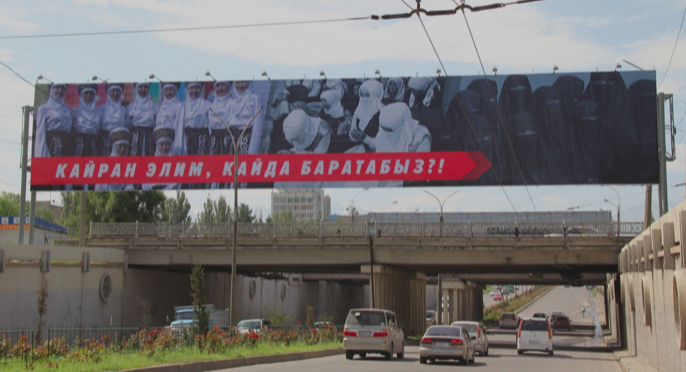
5.2.3. Gender Equality Policies
Under Almazbek Atambayev's leadership, Kyrgyzstan made substantial progress in promoting gender equality. His administration introduced a 33% quota for women's representation in parliamentary lists and a 30% quota for women in local councils, significantly increasing female political participation. For the first time in the country's history, women were appointed to top government positions, including General Prosecutor, Chief Justice of the Supreme Court, and Chair of the Defense Committee in Parliament. Key legislation, such as the Maternity Law and the Domestic Violence Law, was passed, along with the introduction of social benefits for childbirth. Mother's Day was officially established as a national holiday. Furthermore, maternal and child health centers, mammology centers, women's oncology centers, and gynecological disease centers were constructed across the country, improving healthcare access for women.
5.2.4. Secularism Policies
Atambayev actively pursued a secular policy, taking a firm stance against the processes of Islamization in Kyrgyzstan and upholding the principle of separation of religion and state. Despite public pressure from Islamic theologians and the muftiate, Atambayev staunchly defended the rights of Kyrgyz women to dress as they wished. He famously stated, "Listen, since the 50s, women in Kyrgyzstan have been wearing miniskirts, but none of these women have ever thought of putting on a suicide belt and blowing someone up. Go ahead and wear a tarpaulin boot on your head, but don't blow anyone up. Because that's not a religion. The essence of every religion is kindness, a kind attitude towards people. If you think that someone's head should be cut off or that someone should be forced to wear what they should wear, that's not a religion. We must fight this. Let them wear miniskirts, but don't blow anyone up. Because the main problem in the world today is terrorism."
5.2.5. Defense Reforms
In November 2015, by Atambayev's orders, the Ministry of Defense was re-branded as the State Committee for Defense Affairs. Authority over the Armed Forces of Kyrgyzstan was transferred to the General Staff, with the Chief of the General Staff exercising authority as the paramount leader of the military, second only to the president. In December 2016, Atambayev signed a decree officially abolishing the use of military courts in Kyrgyzstan.
5.3. Foreign Policy
Atambayev's foreign policy sought to balance relations with major global powers and regional partners while asserting Kyrgyzstan's sovereignty and economic interests.
5.3.1. Relations with the European Union
Atambayev made four visits to Brussels as president (in 2011, 2013, 2015, and 2016), underscoring his commitment to strengthening ties with the European Union. From March 22 to April 1, 2015, he undertook a tour of European countries, including Switzerland, Austria, France, Belgium, and Germany, resulting in numerous agreements to deepen relations in various fields, from cultural exchange to investment cooperation. The EU provided consistent support for Kyrgyzstan's democratic reforms; under agreements reached by Atambayev, the EU allocated 184.00 M EUR to the Kyrgyz Republic for the period 2014-2020, targeting the development of education, the rule of law, and rural development. A historic highlight was Angela Merkel's visit to Kyrgyzstan in 2015, marking the first time a German Federal Chancellor visited the independent Kyrgyz Republic and the first visit of a German Chancellor to the Central Asian region.
5.3.2. Relations with CIS Countries and Others
In 2011, shortly after becoming president, Atambayev traveled to Turkey and signed an agreement with the Turkish President, Abdullah Gül, to increase trade from 300.00 M USD in 2011 to 1.00 B USD by 2015. Turkey also committed to attracting 450.00 M USD in Turkish investment to Kyrgyzstan within a few years. In 2013, Atambayev launched a strong criticism against the United Kingdom, accusing it of undermining democracy by hosting Maxim Bakiyev, the son of former President Bakiyev, in London. He questioned the UK's double standards, stating, "Is Britain hosting the kids of [Muammar] Gaddafi or Bashar al-Assad? Why are there double standards against Kyrgyzstan? Britain is saying: 'We want to help with democratic development in Kyrgyzstan.' That's a lie. You're hosting a guy who robbed us. We could use that money to fund fair elections."
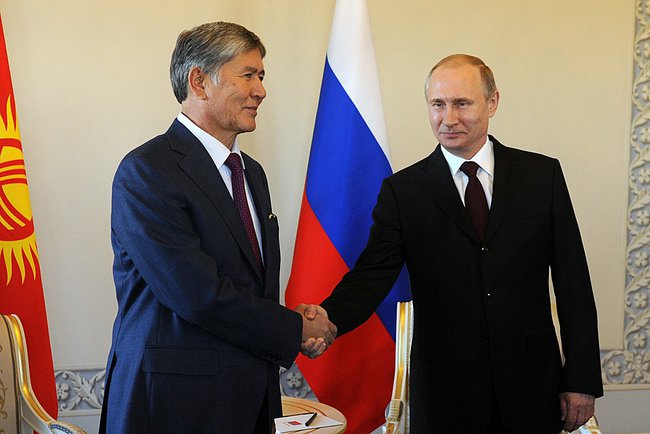
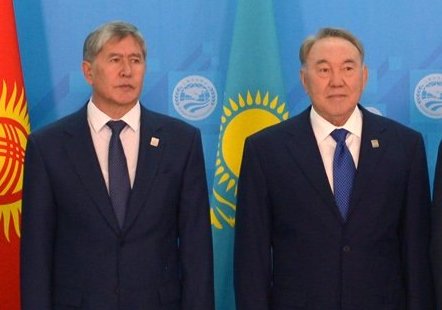
In February 2015, tensions arose with Belarus following the death of Almanbet Anapiyaev, which Atambayev attributed solely to former Security Service chief Janish Bakiyev, who was being sheltered in Minsk alongside his father. The Belarusian Foreign Ministry dismissed the statement as not warranting a comment. In May 2015, during a Victory Day meeting of CSTO leaders in Moscow, Atambayev engaged in an argument with Uzbek President Islam Karimov regarding Central Asia's water resources. Later that year, he met with Supreme Leader of Iran Ali Khamenei in Iran, emphasizing that "Iran and Kyrgyzstan are two brotherly nations with a common religion, history and culture and there is a spirit of pursuing freedom and independence among both nations."
On September 13, 2013, Atambayev hosted the SCO summit in Bishkek. In August 2015, he attended China's V-Day parade in Beijing and reviewed the Kyrgyz military parade. In May 2017, he attended the Belt and Road Forum in China. He also visited Japan in February 2013 and met with Prime Minister Shinzo Abe.
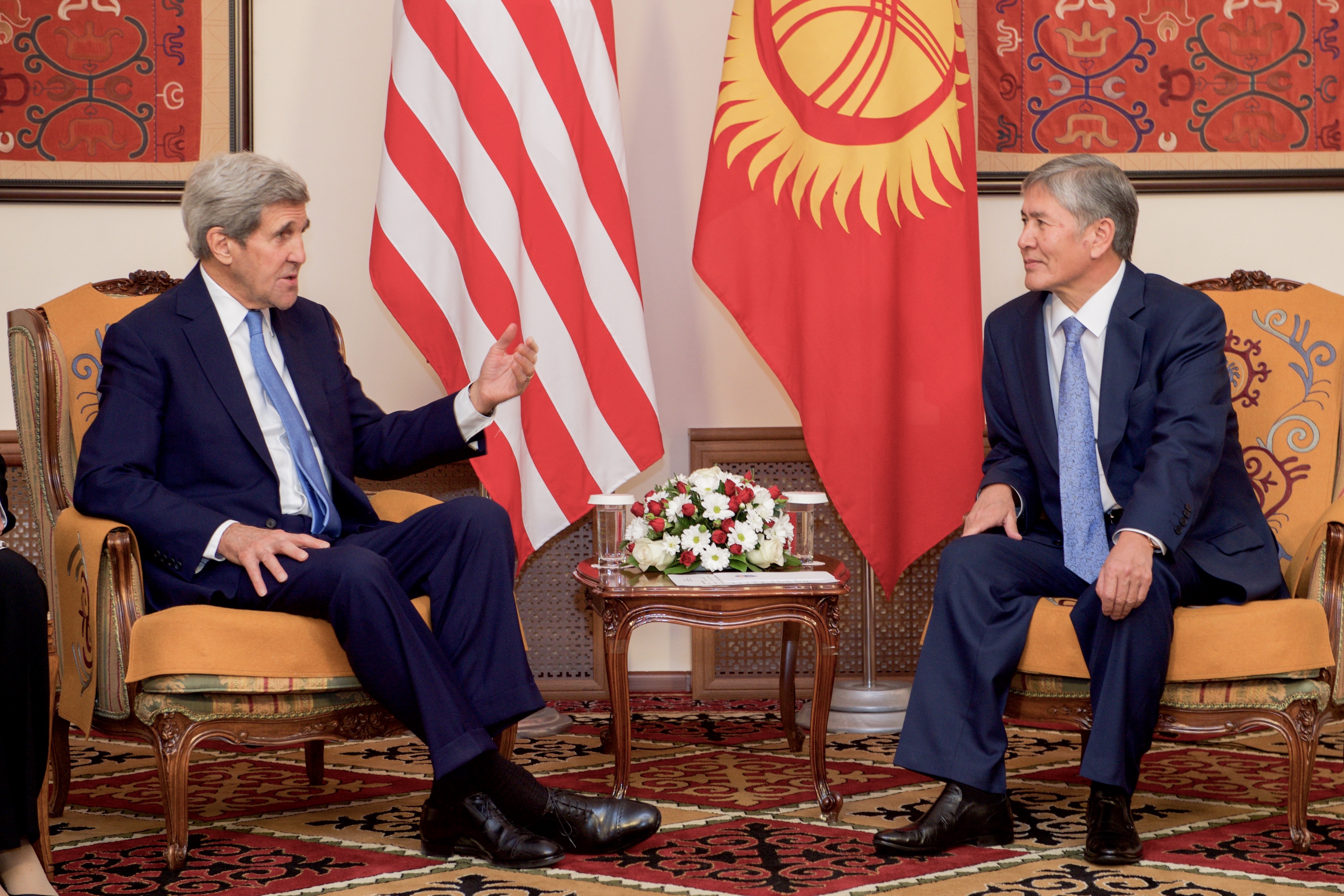
During the 2017 Kyrgyz presidential election, Atambayev accused Kazakhstan of sponsoring one of the presidential candidates, Ömürbek Babanov, and further alleged corruption among Kazakh officials for looting pensioners' incomes. On October 9, 2017, Atambayev announced his refusal to attend the CIS heads of state summit in Sochi, which would have required him to meet with Kazakh President Nursultan Nazarbayev. In the same month, he made a breakthrough visit to the Uzbek capital of Tashkent, a significant diplomatic gesture for a Kyrgyz leader. Atambayev also oversaw Kyrgyzstan's entry into the Customs Union and secured the withdrawal of the American military base from the country in 2014. He emphasized the need for closer economic relations with the Russian Federation, where at least 500,000 Kyrgyz citizens are employed, while also expressing a desire for greater economic and energy independence from Russia. Atambayev firmly stated that the Russian military base would also be withdrawn from Kyrgyzstan, asserting that "In the future, Kyrgyzstan should rely and hope only on its armed forces, and not on the military bases of Russia, America or another country. We must build our own army." In early 2012, during a visit to Moscow, he called for Russia to pay the 15.00 M USD owed to Kyrgyzstan for its use of the Kant airbase.
5.4. Key Policies and Initiatives
Atambayev's presidency saw the implementation of specific policies and initiatives aimed at cultural preservation and historical commemoration.
5.4.1. Launch of the World Nomad Games
Atambayev was a strong proponent of the World Nomad Games, supporting their launch in 2014 with the aim of preserving and popularizing the nomadic traditions of Central Asia. The Games quickly became a significant international platform for showcasing the cultural heritage, sports skills, and traditional sports of nomadic nations, thereby fostering cultural ties and mutual understanding among peoples from different countries. The project received support from UNESCO. The first three editions of the World Nomad Games were held in Cholpon-Ata, Kyrgyzstan. The fourth games took place in Iznik, Turkey, from September 29 to October 2, 2022, and the 2024 games are scheduled for Astana, Kazakhstan, from September 8-13. To popularize the event, Atambayev personally led the Kyrgyz national team at the opening ceremonies of the first two World Nomad Games in 2014 and 2016.
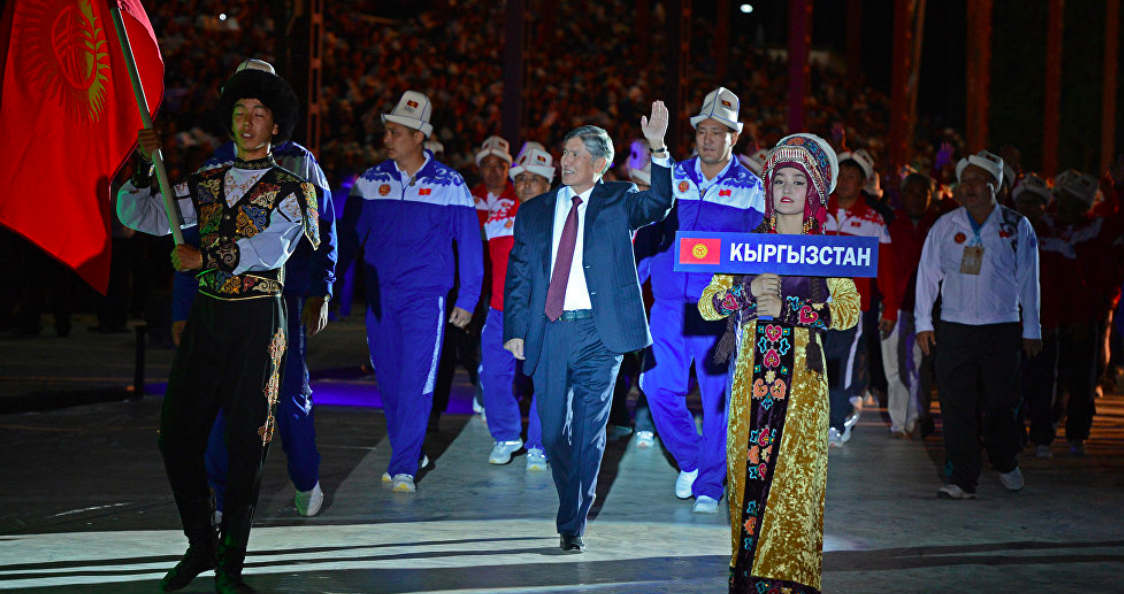
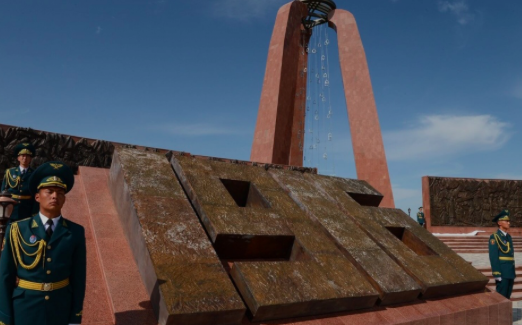
5.4.2. Memory of the 1916 Central Asian Revolt
Almazbek Atambayev holds the distinction of being the only Central Asian president in the region's history to honor the memory of the victims of the 1916 massacre, which was carried out by the punitive troops of the Russian Empire. This tragic event, known as the Urkun or Central Asian Revolt of 1916, represents a painful chapter in the region's history. The unveiling of a monument dedicated to the victims became a powerful symbol of respect and remembrance for these terrible events. Atambayev's actions underscored the importance of historical memory and unity in confronting past injustices, and his decision was widely seen as a significant step toward national reconciliation and strengthening the identity of Central Asian peoples. On September 17, 2016, the Presidents of Kyrgyzstan (Almazbek Atambayev), Russia (Vladimir Putin), Armenia (Serzh Sargsyan), and the Prime Minister of Moldova (Pavel Filip) jointly honored the victims by laying flowers at the Memorial to those killed in 1916 at the Ata-Beyit memorial complex. In October 2017, President Atambayev signed a law establishing the "Day of History and Remembrance of Ancestors," to be celebrated on November 7-8, in commemoration of the uprising and exodus of the Kyrgyz people. In 2015, Atambayev controversially abandoned the use of the Ribbon of Saint George, a symbol commonly used in post-Soviet countries and Russia, as a symbol of memory for the 1916 uprising. This decision sparked protests among the Russian-speaking population in Kyrgyzstan.
5.4.3. GSP+ Status Attainment
Under Almazbek Atambayev's leadership, Kyrgyzstan achieved GSP+ status with the European Union in 2015. To maintain this preferential trade status, Kyrgyzstan committed to complying with 27 international conventions. Seven of these conventions specifically relate to human rights, covering areas such as protecting the rights of children, eliminating discrimination against women and minorities, safeguarding freedom of speech and assembly, ensuring the right to a fair trial, guaranteeing the independence of the judiciary, and upholding economic, cultural, and social rights.
6. Post-Presidency and Legal Issues
Following his presidency, Almazbek Atambayev became embroiled in political conflicts with his successor, leading to a loss of immunity, arrest, imprisonment, and significant international attention regarding his legal and health status.
6.1. Criticism of the Jeenbekov Government
After leaving office on November 24, 2017, and peacefully transferring the presidency to his successor and former prime minister, Sooronbay Jeenbekov, Atambayev resumed his role as head of the SDPK. In his post-presidency, he re-entered the political arena, most notably by publicly criticizing his own successor. This criticism, which began in the spring of 2018, primarily centered on Jeenbekov's alleged establishment of a "family clan regime," marked by nepotism and corruption. Media reports at the time frequently highlighted the extensive network of Jeenbekov's relatives holding high positions within the state apparatus, embassies, and parliament. On March 17, 2019, Atambayev publicly expressed regret, stating, "I apologize to everyone for bringing this person to power."
6.2. Stripping of Immunity and Detention
In June 2019, MPs in Kyrgyzstan voted to strip Atambayev of his presidential immunity, paving the way for criminal charges against him. This move followed a public statement in February by Erkinbek Mamyrov, the Head of the Constitutional Chamber, who asserted that "there is no retroactivity of law" and that Atambayev could not be deprived of presidential immunity in accordance with the Law of the Kyrgyz Republic on Guarantees for the Activities of the President. For these statements, Mamyrov was subsequently replaced by an assistant to President Jeenbekov's brother, Asylbek Jeenbekov, in parliament. In response, Atambayev stated from his residence in Koy-Tash that he would await the decision of the Constitutional Chamber and defend his constitutional rights, declaring, "The Constitutional Court must put an end to the question of the legality or illegality of interrogation." He vowed to "stand to the end" against Jeenbekov's alleged family clan regime. At that time, he remained under the protection of state security officers while his complaint to the Constitutional Court was under consideration. On July 3, Atambayev left his residence for the first time in weeks to address a rally of 1,000 supporters who demanded that all charges be dropped. On July 24, he began a two-day visit to Russia with an SDPK delegation, departing from Kant Air Base on a Sukhoi Superjet 100. During this visit, he met with President Vladimir Putin in the Kremlin.
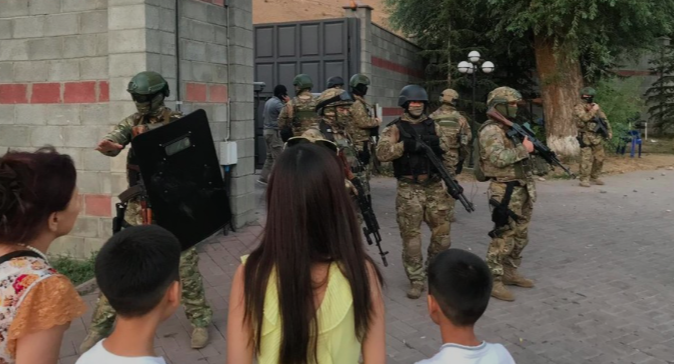
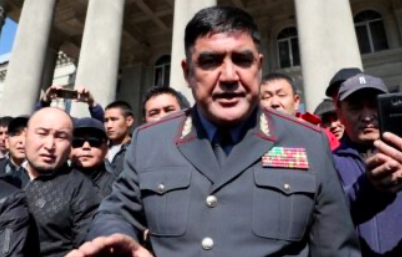
6.3. Imprisonment and Health Concerns
On August 7, 2019, the Special Forces of Kyrgyzstan launched an attack on Atambayev's residence in Bishkek. This raid resulted in the death of one soldier and injuries to hundreds of civilians and military personnel. During a meeting of the Security Council, President Jeenbekov accused Atambayev of "rudely violating the constitution." A second raid was conducted the following day, after which Atambayev surrendered to security forces. On August 9, 2019, special forces illegally seized the office of the Social Democratic Party of Kyrgyzstan and the April TV channel, which broadcast opposition views. All party documents, organizational equipment, and other property belonging to the SDPK were illegally confiscated. The special services, having obtained information about SDPK members nationwide from party computers and servers, began summoning all members for interrogations and exerted strong pressure on them. Subsequently, 1,700 individuals submitted an appeal to the General Prosecutor's Office of the Kyrgyz Republic, requesting the initiation of a criminal case against President Sooronbai Jeenbekov for his illegal actions. In response, these 1,700 individuals were themselves summoned for interrogations and subjected to intense pressure, including warnings and threats. On August 13, Orozbek Opumbayev, the head of the State Committee for National Security (SCNS), stated that Atambayev was plotting to overthrow the government before his detention. Kursan Asanov, the vice-minister of Internal Affairs and head of Atambayev's arrest operation, later revealed that during the August 2019 storming of Atambayev's residence in Koy-Tash, where over a thousand law enforcement representatives were present, there was an order "not to take ex-president Atambayev alive." The population, particularly in the Chüy Valley, largely supported Atambayev, viewing the accusations against him and the attacks on the SDPK as political pressure on the opposition.
On June 23, 2020, Atambayev was sentenced to 11 years in jail for corruption in the "Batukaev case." He had initially been imprisoned in August 2019 on charges of corruption and manslaughter, though he was later acquitted of these specific charges. On October 5, 2020, during the 2020 Kyrgyzstani protests, election protestors freed him from prison. However, after surviving an assassination attempt on October 8, he was re-imprisoned on October 10 for his alleged participation in the turmoil of the Kyrgyz Revolution of 2020, but was later acquitted of these criminal charges as well. Ultimately, Atambayev was acquitted in all criminal cases against him in February 2023.
During his imprisonment, Atambayev faced severe health challenges and alleged mistreatment. On March 23, 2022, his spine was damaged due to violence by prison guards, and numerous abrasions and signs of beatings were found on his body. This was confirmed on March 25 by the state National Center for the Prevention of Torture of the Kyrgyz Republic and subsequently by a medical examination at the National Center for Cardiology. Atambayev was denied not only treatment but also a thorough medical examination for an extended period. It was only after Socialist International Secretary General Luis Ayala made a special visit to Kyrgyzstan in 2022 and the Socialist International issued a special statement that Atambayev was briefly transferred to a clinic for examination. He was diagnosed with Barrett's esophagus and required two surgical operations on his esophagus, but these were not carried out while he was in detention.
6.4. International Support
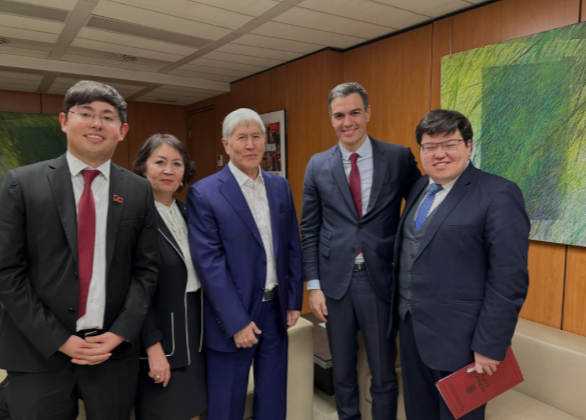
Almazbek Atambayev's legal and health issues garnered significant international attention and support. On July 8, 2022, the Council of the Socialist International, representing 63 political parties worldwide, issued a statement asserting that "the manner in which the former president has been detained, tried and sentenced contravenes his legal and human rights as a defendant, violates the Kyrgyz Code of Criminal Procedure and breaches international judicial norms." The organization further noted that the actions of the armed forces against civilians in Koi-Tash on August 7-8, which resulted in severe injuries and the use of brute force against 1,700 civilians, could fall under the articles of "war crime" and "crime against humanity," warranting an international investigation. His son, Kadyrbek Atambaev, spoke about the torture his father endured at the Socialist International Congress. Following sustained efforts, including support from Socialist International President and Prime Minister of Spain Pedro Sánchez, Atambayev was eventually released and transported to Spain for necessary medical operations. German Chancellor Angela Merkel also sent a New Year 2020 greeting card to Atambayev's family while he was still incarcerated.
7. Assassination Attempts
Almazbek Atambayev faced multiple assassination attempts throughout his political career, underscoring the volatile political climate in Kyrgyzstan.
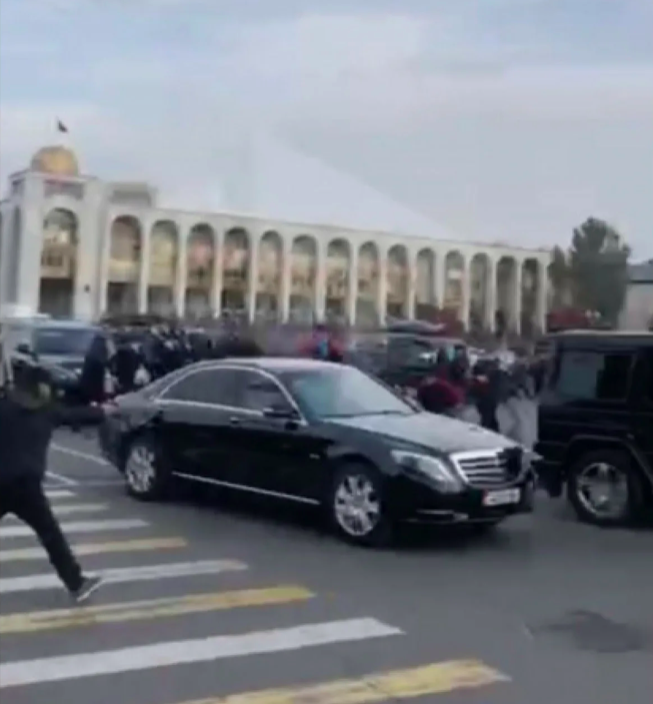
- May 2007 (during Prime Ministership):** An assassination attempt was made on Atambayev through poisoning on May 11, 2007, during his first term as Prime Minister. Turkish doctors at a military medical hospital in Ankara later confirmed that the poisoning was caused by an unknown substance. Atambayev speculated, "I probably have many enemies now. There are many offended, apparently. Because of my attempts to nationalize the Kristall semiconductor materials plant, they threaten me with physical violence." It was widely assumed that individuals from the presidential administration, including the president's son Maxim Bakiyev and the president's brother Janish Bakiyev, who served as deputy chairman of the State Committee, might have been involved in the poisoning.
- July 2009 (during Presidential Campaign):** On the eve of a meeting with voters in the Bazarkorgon district of the Jalalabad region, Atambayev, then the sole candidate from the united opposition bloc for the presidential elections, was again poisoned. After breakfast at a local hotel, he felt unwell on his way to the scheduled meeting. Despite his deteriorating condition, he proceeded with the meeting but experienced a loss of movement coordination upon exiting his car. His spokesman, Zhomart Saparbayev, reported that Atambayev "felt terrible, his nails turned brown, he was vomiting and dizzy." He subsequently underwent treatment in Turkey.
- August 2019 (during Koy-Tash Raid):** During the storming of his residence in Koy-Tash village in August 2019, which involved over a thousand law enforcement representatives, Kursan Asanov, the vice-minister of Internal Affairs and head of Atambayev's arrest operation, later disclosed that there was an explicit order "not to take ex-president Atambayev alive."
- October 2020 (during Protests):** During a rally of the united opposition led by Almazbek Atambayev and Omurbek Babanov in October 2020, Atambayev's car was fired upon with bullets. A video of this assassination attempt quickly went viral on social media.
8. Awards and Honors
Almazbek Atambayev has received numerous national and international accolades throughout his career, recognizing his contributions to Kyrgyzstan and his role in international relations.
8.1. Kyrgyzstan
| Award | Date | Citation |
|---|---|---|
| Hero of the Kyrgyz Republic | November 27, 2017 | Highest degree of distinction. |
| Order "Danaker" | November 28, 2007 | For contribution to the social and economic development of the republic and fruitful work to preserve inter-ethnic harmony. |
| Order "Manas" II Class | December 1, 2011 | For civic responsibility and courage during the years of struggle against the authoritarian family-clan regime, consistent defense of the ideas of democracy, freedom of expression and peaceful assembly, active participation in the constitutional reform, the formation of the democratic parliament and also in connection with the successful completion of the transition period after the April 2010 People's Revolution. |
| Dank Medal | 1999 | For the fruitful activity in the industrial production sector in Kyrgyzstan. |
8.2. Foreign honors
| Award | Country | Date | Citation |
|---|---|---|---|
| Presidential Order of Excellence | Georgia | 2013 | |
| Order of Dostyk I degree | Kazakhstan | November 7, 2014 | For the contribution to the development of friendship between Kazakhstan and Kyrgyzstan. |
| Order of Alexander Nevsky | Russia | September 17, 2016 | For the extraordinary contribution to the strengthening of multiform cooperation between the Russian Federation and Kyrgyzstan in a spirit of mutual trust and strategic partnership. |
| Order "Friend of Azerbaijan" | Azerbaijan | 2016 | |
| Fascia dell'Ordine della Repubblica di Serbia | Serbia | 2013 | For merits in the development and strengthening of peaceful cooperation and friendly relations between Serbia and Kyrgyzstan. |
9. Evaluation and Controversies
Almazbek Atambayev's presidency is viewed as a period of significant democratic reform and a pivotal moment for Kyrgyzstan's political landscape, marked by a peaceful transfer of power unprecedented in Central Asia. His commitment to strengthening parliamentary democracy through constitutional amendments and introducing a biometric election system significantly enhanced the transparency and fairness of electoral processes. Policies promoting gender equality, including quotas for women in political bodies and the establishment of women's health centers, underscore his administration's focus on social progress. His support for the World Nomad Games and the commemoration of the 1916 Central Asian Revolt were instrumental in fostering national identity and cultural preservation. International figures like George Soros and António Guterres lauded his efforts against corruption and his dedication to human rights and democratic principles.
However, Atambayev's post-presidency period was fraught with controversy and legal challenges. His public criticism of successor Sooronbay Jeenbekov, particularly regarding allegations of a "family clan regime" and corruption, escalated into a political feud. The subsequent stripping of his presidential immunity and his arrest led to violent clashes at his residence, raising concerns about the rule of law and the treatment of political opponents. His imprisonment on charges, including the "Batukaev case," was met with accusations of political motivation and procedural violations, with the Supreme Court later overturning a guilty verdict due to these irregularities. Reports of his mistreatment in prison and denial of medical care, which led to international intervention and his eventual release for treatment abroad, highlighted significant human rights concerns. The Socialist International critically assessed his detention and trial, suggesting that actions against civilians during his arrest could constitute "war crimes" or "crimes against humanity." These later events cast a shadow over his legacy, contrasting sharply with his earlier achievements in democratic governance and peaceful power transition.